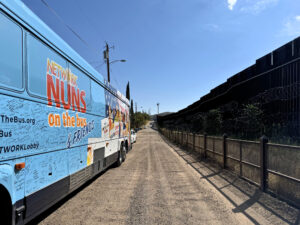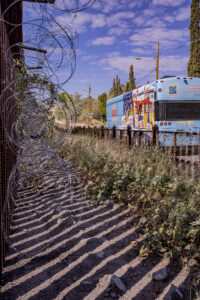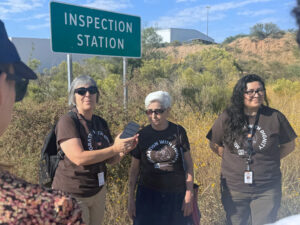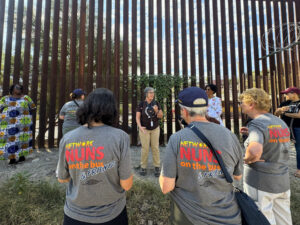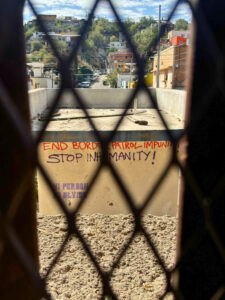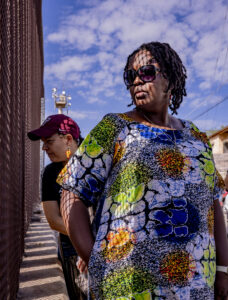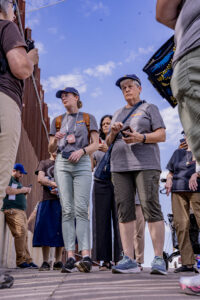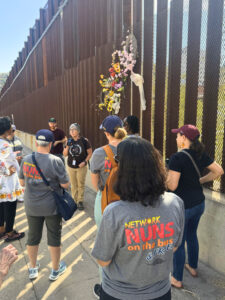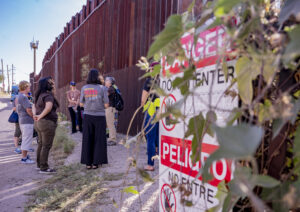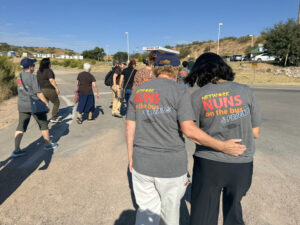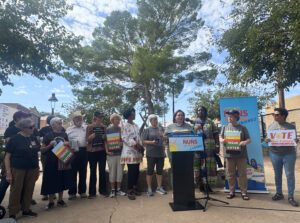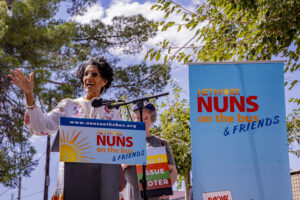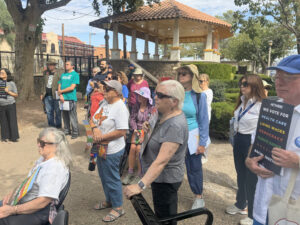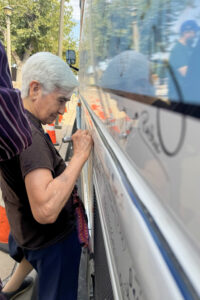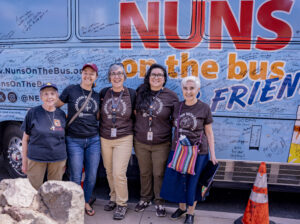Our Blog
A Pilgrimage of the Heart to Nogales, Arizona
What if the United States once again became a place of welcome?
October 14, 2024 | By Sr. Janet Kinney, CSJ
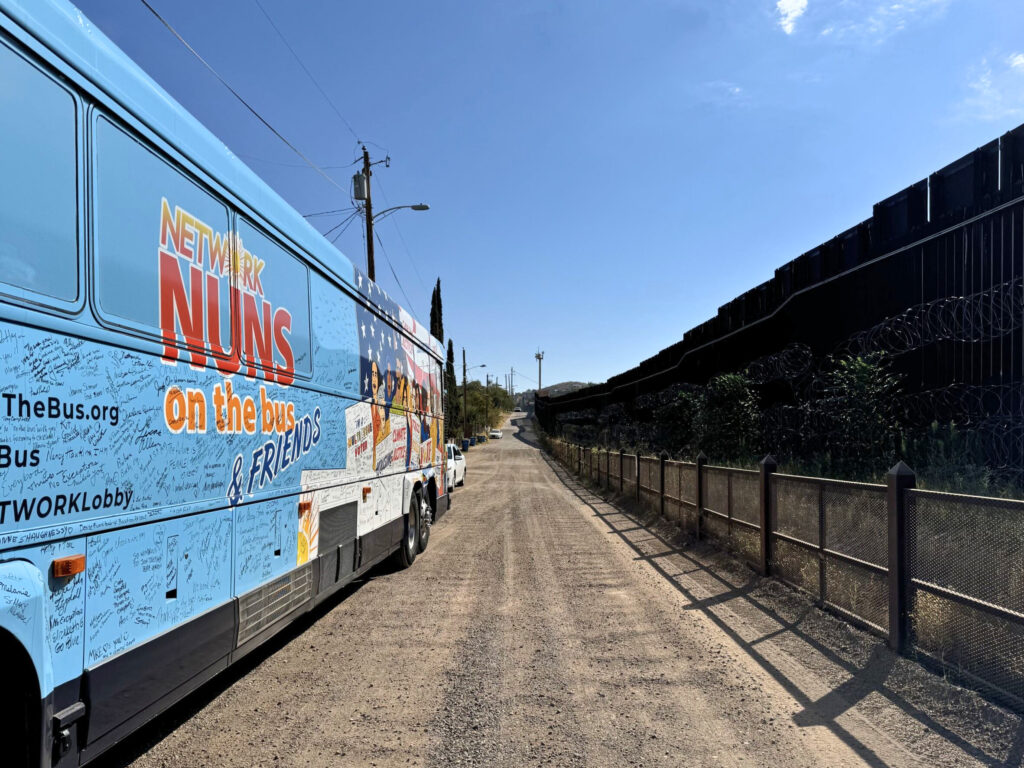
We arose early—along with the rising sun—to greet the day before us!
This morning’s site visit, which was followed by a press conference at Nasir Karam Park, was a reverent pilgrimage, a sacred journey in which the Nuns on the Bus & Friends spent time with those who minister at the border in Nogales, Arizona, and Sonora/Nogales, Mexico.
Our trip began at the first of three border crossings, where we learned that this is the primary “commercial” crossing of all products and goods that enter the United States, i.e., fresh produce and other items commonly imported through Mexico. Looming in the background was our first sighting of the “border wall” that separates those who seek freedom in this country.
We were joined there by Sisters who have been part of the Kino Border Initiative (KBI). Sister Engracia Robles, ME spoke of the humble beginnings of herself and the Sisters of the Eucharist, who responded to the needs of migrants who were either deported back to Mexico or were waiting to enter the United States. Initially a ministry of presence, they soon began to provide for the migrant’s basic needs and, within a few years, were joined by the Jesuits. Together, they helped create the Kino Border Initiative.
One of our guides, Sister Eileen McKenzie, a Franciscan Sister of Perpetual Adoration who also ministers at Kino, encouraged us to enter into a spirit of pilgrimage, a spirit which then pervaded the rest of our visit.
Hopping back on the bus, we traveled to the heart of Nogales, where we disembarked and slowly walked along the border wall that separated the city from Mexico. Poignantly, we saw families “visiting” one another through the slats — the free and the unfree. A little further along, a discarded shoe was seen on the U.S. side. I pondered what the journey was like for the person who left it behind. Did his story have a happy ending, or was he one of the countless others who were turned back?
We continued our walk along the border wall, with its cascades of rolls upon rolls of barbed wire on the U.S. side, an attempt to discourage those desperate to come. The cruelty of treating our fellow humanity in this way chilled my soul.
As we peered through to the other side of the wall, we saw a simple shrine, which we were told marked the spot where a 16-year-old boy, Jose Luis, was shot and killed by Border Patrol back in 2012. Jose Luis was walking to the family’s small bodega to assist his brother in locking up for the night when he realized a patrol officer was watching him. He began to pick up rocks in the road to throw at the agent, who proceeded to shoot a dozen bullets into his small body. Jose Luis did not survive.
While the agent was brought to trial, he was found not guilty. Jose’s family, however, persisted in their protest as to what had happened to their brother and son, and as a result of their advocacy and efforts, policy changes have been made in the lethal use of force by border agents. Despite their son’s tragic death, for the family, this was a sign of hope that all their efforts were not in vain. Another family might not have to suffer such a loss.
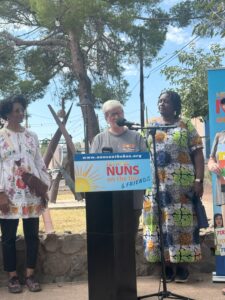
Sr. Janet Kinney, CSJ speaks at the press conference following the Nuns on the Bus & Friends visit to the U.S.-Mexico border in Nogales, AZ on Oct. 13.
Our final destination was the one border entry from Nogales, Sonora, Mexico, where people can cross and ask for asylum. Today, the entry process has changed, and appointments must be made through an App (CBP1) before one can cross over. Getting an appointment could take months since only 100 appointments are available daily!
Our pilgrimage lasted only a few hours, yet we wondered about the pilgrimages of those seeking asylum in this country, a journey that could take days, weeks, or months. We wondered what it would be like if the United States once again could be seen as a place of welcome — providing the freedom to live to these sojourners who only desire simple dignity and a safe place to live and raise their families.
We ended our time in Nogales with a closing press conference, after which the local media interviewed me. During the press conference, we encouraged the attendees to support pathways to citizenship, protect the rights of asylum seekers, and to resist measures that are antithetical to the values and freedoms we hold sacred.
I could not leave without being touched by what we saw and felt. As Pope Francis has said, “The encounter with the migrant—as with every brother and sister in need—is also an encounter with Christ.”
May we look forward to the day in this country where these are not just words we aspire to but are reflected in how we welcome the people who seek refuge at our borders.
The bus parks at the border fence in Nogales, AZ during the Nuns on the Bus & Friends visit on Oct. 13.
Kino Border Initiative staff including Sr. Eileen McKenzie, FSPA lead a tour of the U.S.-Mexico border during the Nuns on the Bus & Friends visit on Oct. 13.
View through the U.S.-Mexico border fence in Nogales, AZ, during the Nuns on the Bus & Friends Oct. 13 site visit.
Sr. Mumbi Kigutha, CPPS surveys the border fence during the Nuns on the Bus & Friends visit to Nogales, AZ on Oct. 13.
Sr. Janet Kinney, CSJ (right) listens to a guide from the Kino Border Initiative during the Nuns on Bus & Friends visit to the U.S.-Mexico border in Nogales, AZ on Oct. 13.
Nuns on the Bus & Friends reach a memorial on the U.S.-Mexico border fence at Nogales, AZ, during their visit on Oct. 13.
Sr. Richelle Friedman, PBVM accompanies Laura Peralta-Schulte of the NETWORK staff during the Nuns on the Bus & Friends visit to the U.S.-Mexico border on Oct. 13.
Sr. Janet Kinney, CSJ speaks at the press conference following the Nuns on the Bus & Friends visit to the U.S.-Mexico border in Nogales, AZ on Oct. 13.
Lisa Sharon Harper speaks at the press conference following the Nuns on the Bus & Friends visit to the border in Nogales, AZ on Oct. 13.
A crowd gathers for the press conference following the Nuns on the Bus & Friends site visit to the U.S.-Mexico border in Nogales, AZ on Oct. 13.
Sr. Maria Engracia Robles, ME of the Kino Border Institute signs the bus following the Nuns on the Bus & Friends visit to the U.S.-Mexico border in Nogales, AZ, Oct. 13.

